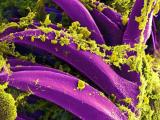Apr 21, 2005 (CIDRAP News) – The US Department of Defense (DoD) has announced plans to collaborate with the defense departments of Canada and the United Kingdom to develop a vaccine for plague, which would fill an empty slot in the nation's current vaccine arsenal.
The three countries have been sharing information on plague vaccines since 2000, and the United States and the UK have been working separately to develop them since the 1990s, the DoD said in an Apr 15 news release.
Plague is a fairly uncommon disease in the United States today, with 390 cases reported to the Centers for Disease Control and Prevention from 1947 through 1996. But the plague agent is one of six pathogens the government believes terrorists are most likely to try to use as a biological weapon.
An experimental plague vaccine developed by DoD is in a phase 1 clinical trial that began earlier this year at the University of Kentucky, the DoD announcement said. A British plague vaccine candidate will be tested in a separate phase 1 trial in the United States later this year.
"This joint effort will continue until late 2005, at which time the DoD will evaluate both vaccine candidates and select one for continued advanced development," the statement said.
A licensed vaccine against plague was available in the United States until 1999, when the single manufacturer stopped making it. It was used to immunize US troops during the Vietnam War, because plague was fairly common in Vietnam at the time. The product was a whole-cell vaccine that used inactivated Yersinia pestis, the plague bacterium.
The vaccine prevented bubonic plague (the most common form of plague, associated with flea bites and leading to swollen lymph nodes, fever, and other symptoms) but did not protect against pneumonic plague (lung infection, usually from inhaling the pathogen).
The vaccines now being tested are "subunit" vaccines made of particular proteins found on the surface of Y pestis, rather than whole cells.
The British vaccine contains the plague organism's F1 and V antigens, derived separately from recombinant Escherichia coli. "The DoD vaccine contains the F1 and V antigens linked together as a fusion protein," the DoD statement said. It was developed by the US Army Research Institute of Infectious Diseases and, according to previous reports, has been tested successfully in mice, ferrets, and monkeys.
The DoD program is managed by the Joint Vaccine Acquisition Program in the office of the Joint Program Executive Office for Chemical and Biological Defense.
See also:
Apr 15 DoD news release
http://www.defense.gov/releases/release.aspx?releaseid=8397
CIDRAP overview of plague
https://www.cidrap.umn.edu/plague















